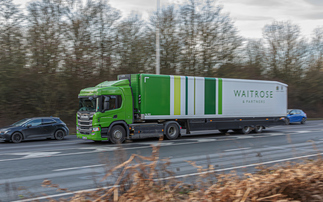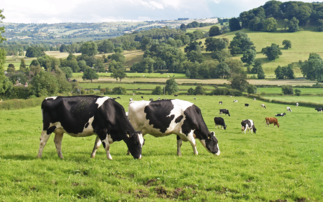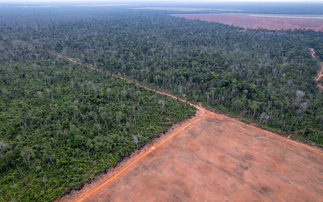The seafood giant explains how partnerships are at the heart of its Sustainable Development Goal strategy
Thai Union, one of the world's biggest seafood companies, takes the Sustainable Development Goals (SDGs) seriously - it has specific targets relating to SDG2 on Ending Hunger, SDG8 on Decent Work and Economic Growth, and SDG14 on Life Below Water. Like many businesses it does not specifically mention SDG17 in its strategy, "but of course collaboration for partnership runs through all the other goals," admits Darian McBain, executive advisor on Corporate Affairs and Sustainability. "Although it's not explicitly included, it's crucial to the Goals," she adds.
SDG17 and its focus on partnership in support of the other 16 goals can be seen as something of an afterthought - a goal that is one step removed from the firm targets offered by most of the other SDGs. But McBain insists it is a valuable addition to any SDG strategy. "It's a recognition that achieving the SDGs is so huge and all-encompassing that no one company, no one government and no single NGO can do it by themselves," she argues. "SDG17 is a recognition that no matter which aspect of the Goals you are looking at, we can't do it in siloes."
Of course, successful partnering is easier said than done. It requires organisations to share goals and information, often overcoming understandable mistrust and competing priorities. Partnerships evolve over time, but the key to successful alliances is in finding outcomes that different organisations can agree to, McBain stresses. "Thai Union is a global business and it has a different mission to an NGO, but on a Venn diagram, there is an overlap where we're both trying to achieve the same thing and can go further together than by working on our own," she says.
The fisheries industry faces a number of significant sustainability issues, including overfishing and poor labour conditions for workers on fishing boats, many of whom are migrants and particularly vulnerable to modern slavery abuses.
As such Thai Union has developed a variety of partnerships in recent years, with competitors, governments, and NGOs, including Greenpeace, which was previously one of the company's biggest critics, having organised a years-long campaign to get the company to reform its fishing and labour practices.
Thai Union has also worked with its suppliers to implement a Vessel Improvement Programme, to help them meet its code of conduct for sustainability and labour rights. Rather than cutting suppliers off for falling short of its standards, the programme helps them build capacity for sustainability, so that they can change their practices for the long-term and benefit all the businesses they supply, not just Thai Union. The programme was developed by the company in partnership with Greenpeace and the International Transport Workers Federation (ITF).
"Greenpeace admitted that they were not experts in human rights and they wanted us to work with the ITF," McBain explains. "We hadn't considered working with a union, but they have so much experience of working with seafarers that it has been really valuable."
It is a prime example of how different perspectives can strengthen an initiative or project. "We look for partners who have different skillsets, information and even a different perspective to us," McBain says, "where they can add value to what we're trying to achieve and where what we bring to the table helps them."
The company has also partnered with WWF, to develop fishery improvement projects in some of the world's largest and most important fisheries, helping to bring together the often fragmented stakeholders in a fishery, including governments, NGOs, seafood producers, and fishing vessel owners, to agree a framework and action plan for sustainable management. "The ultimate goal of these initiatives is to set a fishery on the path to sustainable certification by the Marine Stewardship Council," the company says.
And it has even teamed up with customers such as Mars Petcare to develop technological solutions to issues on board vessels. The partnership has seen the companies pilot a satellite communication platform on boats, which paved the way for Thai government regulations requiring vessel owners to install satellite phones, allowing crew to flag concerns about their working conditions from international waters.
Another project involved working with a company called Calysta to develop a lab-grown alternative protein feed for shrimps that uses natural gas as a feedstock, reducing the need for wild caught fishmeal. To extend support for alternative protein development, the company launched Space-F, a food tech incubator which is already working with start-up Flying Spark on the development of insect larvae protein.
One of the company's most ambitious collaborations, SeaBoS (Seafood Business for Ocean Stewardship) emerged from a paper and dialogue produced by the Stockholm Resilience Centre. The initiative identified the largest seafood companies, which have the most significant impact on the oceans, and then sought to bring them together to tackle shared challenges. "The CEOs of 10 of these companies are now working together in collaboration," McBain says. "It's a very business-focused partnership between the companies and scientists, with no NGOs involved. It allows businesses to make decisions based on scientific evidence and allows the scientific community to have an impact on the business world."
This kind of cross-industry forum can prove particularly valuable for sharing best practices and perspectives. "It allows collaboration between companies that may not have talked to each other because they are in different sectors - aquaculture, feed companies and wild catch - as well as different geographies," McBain continues.
However, there is a limit to what partnerships can be achieved, and there is little point inking agreements with third parties for the sake of it. Like all the best sustainability initiatives, there must be a business case for collaborations if they are to succeed, McBain concludes. "If you're looking to embed sustainability into the way you do business, it has to make business sense," she says. "But done right, SDG 17 is an enabler of the other 16 goals."








